|
|
|
Sort Order |
|
|
|
Items / Page
|
|
|
|
|
|
|
| Srl | Item |
| 1 |
ID:
126445


|
|
|
|
|
| Publication |
2013.
|
| Summary/Abstract |
This article investigates the relationship between power-sharing institutions and the durability of peace after negotiated settlements, employing statistical analyses on a large N data-set of peace agreements signed between 1989 and 2008. In contrast to recent studies which rely on a singular measure of 'political' power-sharing, post-settlement government institutions are empirically evaluated in terms of five key dimensions - executive-level coalitions, legislative proportionality, minority veto powers, military pacts and territorial decentralization. Contrary to the prevalent view that elite power-sharing pacts are key components for stability, the hazard-rate models reveal that executive power-sharing is a particularly unstable form of post-conflict governance. Instead, institutional options that separate belligerent parties and preserve their autonomy, such as territorial power-sharing and proportionality in the military forces, are the most significant predictors of settlement success. It is postulated that executive-level power-sharing is ineffective for stabilizing peace because disputants without genuine intentions of cooperation can enter these coalitions at a low cost.
|
|
|
|
|
|
|
|
|
|
|
|
|
|
|
|
| 2 |
ID:
116353


|
|
|
|
|
| Publication |
2012.
|
| Summary/Abstract |
An emerging tension characterizes conflict resolution practice: promoting power-sharing between ethnic groups while simultaneously mandating women's inclusion in peace processes and in post-conflict institutions. Scholars of ethnic conflict have not adequately theorized the gender implications of power-sharing, and practitioners have failed to implement mechanisms that would make power-sharing representative of constituencies beyond ethno-national cleavages. There is no substantive reason why the representation of women and ethnic groups should be in tension. Nevertheless, gender is often ignored in the power-sharing literature and gender-mainstreaming practices appear irreconcilable with power-sharing practice. Drawing on three cases of post-conflict power-sharing - Bosnia and Herzegovina, Burundi, and Northern Ireland - this article identifies reasons why this tension remains in practice, especially the overriding emphasis in power-sharing on ethno-nationalist elites and conflict protagonists.
|
|
|
|
|
|
|
|
|
|
|
|
|
|
|
|
| 3 |
ID:
121829
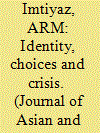

|
|
|
|
|
| Publication |
2013.
|
| Summary/Abstract |
This study attempts to understand the choices made by Muslim political leaders in general, and after independence in particular. Muslim leadership has been broadly classified into two categories based on their respective agendas. This paper looks critically at the choices made by Muslim leaders, as well as some state concessions that could have contributed to growing Islamic fundamentalism. It finally suggests some measures to the current problems of (North and East) Muslims: socio-economic concessions and local power-sharing.
|
|
|
|
|
|
|
|
|
|
|
|
|
|
|
|
| 4 |
ID:
138126
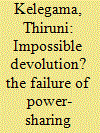

|
|
|
|
|
| Summary/Abstract |
The concept of a ‘primordial homeland’ has been at the centre of Sri Lanka’s armed struggle, in which both Sinhalese and Tamil nationalisms have used claims of ancient and ethnically determined territories to justify their right to self-determination, territorial sovereignty and armed struggle. Through an analysis of historical power-sharing arrangements and the subsequent failures, this article will examine why there has been much difficulty in adapting power-sharing arrangements to the rigidity of the hegemonic ethnic order of Sri Lanka and how this, in turn, has had detrimental consequences for democratic stability and peace making. While recognising the role played by various international actors in pushing for power sharing in Sri Lanka, the article concludes with an analysis of India’s role in this debate, while analysing how devolution has become an important factor in shaping India’s foreign policy towards Sri Lanka.
|
|
|
|
|
|
|
|
|
|
|
|
|
|
|
|
| 5 |
ID:
110768
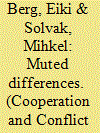

|
|
|
|
|
| Publication |
2011.
|
| Summary/Abstract |
The UNDP report The Silent Majority Speaks (2007) demonstrates widespread consent and a popular desire for change while promoting a single state with strong regions as a compromise model for Bosnia and Herzegovina (BiH). Surprisingly, our own research (2009) on political legitimacy reveals quite the opposite tendencies, where political entities such as the Federation of Bosnia and Herzegovina (FBiH) and the Republika Srpska (RS) more often drift apart than merge together. What strikes us is the fact that the FBiH, which advocates a more integrated state, does not necessarily have more legitimate grounds for achieving that goal than the secessionist counterclaim of RS in its own right. The two entities remain worlds apart on a range of issues and agree only on rather abstract principles of an ideal political order.
|
|
|
|
|
|
|
|
|
|
|
|
|
|
|
|
| 6 |
ID:
186846
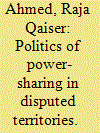

|
|
|
|
|
| Summary/Abstract |
The proper functioning of the government and administration of Azad Jammu and Kashmir (AJK) is taken care of by Pakistan through the successive installment of courts and a series of acts that inter alia include the 1962 Act, the 1970 Act, and the Interim Constitution Act 1974. This paper discusses power-sharing arrangements in AJK, and makes connections to asymmetrical federalism and liminality. It further dissects the matrix of the 13th amendment in the constitution of Azad Kashmir and how it changed the nature of the relationship between AJK and Pakistan. The paper also underscores the contemporary contours of state and polity in AJK and the debate on the 14th amendment.
|
|
|
|
|
|
|
|
|
|
|
|
|
|
|
|
| 7 |
ID:
089143
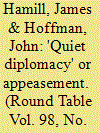

|
|
|
|
|
| Publication |
2009.
|
| Summary/Abstract |
This article offers a critical examination of South Africa's policy of 'quiet diplomacy' towards Zimbabwe since 2000, with the reasons behind it, especially the role of Thabo Mbeki, and considers possible alternatives. It argues that liberal values in Africa are usually prioritised at the abstract level in charters and declarations such as those of the African Union (AU), the Southern African Development Community (SADC), and the New Partnership for Africa's Development (NEPAD). The translation of such values into political practice has, however, become highly problematic, and they have frequently been eclipsed by other, more pressing, imperatives impinging upon the policy-making process. South African policy towards Zimbabwe since 2000, contend the authors, captures this paradox in stark relief.
|
|
|
|
|
|
|
|
|
|
|
|
|
|
|
|
| 8 |
ID:
169225


|
|
|
|
|
| Summary/Abstract |
The war in Syria has caused both external and internal pressures on the Lebanese political system and state institutions. Yet, the Lebanese power-sharing system rests on a set of institutional mechanisms, both state and non-state, which allow its politicians to continue to govern, even in this tumultuous situation, and to respond to crisis. Empirical evidence on how policies were negotiated concerning security, elections, and refugees between 2012 and 2018 shows an interaction between state and non-state institutions and highlights the role of such mechanisms in power-sharing institutions.
|
|
|
|
|
|
|
|
|
|
|
|
|
|
|
|
| 9 |
ID:
137755


|
|
|
|
|
| Summary/Abstract |
People seeking to understand the scope and scale of violence in the Central African Republic over the past two years have cited a variety of social grievances centring on the political manipulation of religion, belonging, and access to opportunities. Without denying that these factors have played a role, this article argues that the violence must be understood in the context of social practices of violence that long predate the war, especially in light of the diffuse and non-centralized mode of organization through which the ongoing war has played out. The article focuses on the prevalence of popular punishment and vengeance, which have long histories as elements of statecraft in the CAR and have become even more widespread amid the generalized insecurity and anomie that have set in over the past few decades. The article presents evidence of the workings of popular punishment from the intra-family level to that of the crowd and quartier, in both rural and urban locales. Though people have important reservations about popular punishment, they also see vengeance as an important tool for enforcing a circumscribed mode of empathy and a minimum set of standards for social behaviour. These experiences in the CAR suggest that those wishing to understand how wartime mobilization happens must consider not just fighters' grievances but also people's conceptions of the practical and symbolic efficacy of vengeance and popular punishment as elements of politics and the management of threats.
|
|
|
|
|
|
|
|
|
|
|
|
|
|
|
|
| 10 |
ID:
178683


|
|
|
|
|
| Summary/Abstract |
Why do former belligerents institutionalize power-sharing arrangements after a civil war ends? The choice of power-sharing institutions shapes the nature of governance in many post-conflict settings. A better understanding of how belligerents come to choose institutionalized forms of power-sharing would thus help us explain how belligerents come to make a seemingly simple institutional choice that may have immense consequences. Existing scholarship emphasizes the nature of the conflict preceding negotiations, international actors, or state institutional capacity as critical factors for determining whether former belligerents will agree to share power or not. Yet these accounts overlook the importance of political considerations between and within ethnic groups. This article argues that elites create power-sharing institutions when the most significant threat to their political power comes from an outside group as opposed to from within their own group. That is, forward-looking and power-minded leaders of former belligerents push for the type of power-sharing at the negotiating table that affords them the greatest opportunity to influence country-level politics after the conflict has concluded in full. For elites facing competition from outside, this means securing power-sharing through institutional rules and guidelines in the settlement of the civil war to ensure that they are included in the governance of the state. By contrast, for elites fearing in-group rivals, complex governance institutions are at best unnecessary and, at worst, a significant concession to weaker opponents. I test the argument with a cross-national analysis of an original dataset of 186 power-sharing negotiations from 1945–2011. The empirical analysis suggests that elites are most likely to institutionalize power-sharing when no single ethnic group dominates politics and when most ethnic groups are unified. The quantitative analysis is complemented with illustrative examples from cases of power-sharing negotiations that offer insight into the proposed theoretical mechanisms.
|
|
|
|
|
|
|
|
|
|
|
|
|
|
|
|
|
|
|
|
|